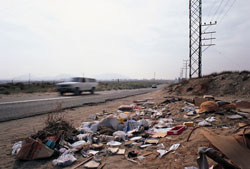Litter Woes: How To Clean It, Prevent It
Dear EarthTalk: What is the impact of all the littering that individuals do, largely from their cars and on highways? What can I do to help clean it up? How can we strengthen laws to prevent it?
—Won’t litter in Norwalk, CT
Environmentalists consider litter a nasty side effect of our convenience-oriented disposable culture. Just to highlight the scope of the problem, California alone spends $28 million a year cleaning up and removing litter along its roadways. And once trash gets free, wind and weather move it from streets and highways to parks and waterways. One study found that 18 percent of litter ends up in rivers, streams and oceans.
Cigarette butts, snack wrappers and take-out food and beverage containers are the most commonly littered items. Cigarettes are one of the most insidious forms of litter: Each discarded butt takes 12 years to break down, all the while leaching toxic elements such as cadmium, lead and arsenic into soil and waterways.
The burden of litter cleanup usually falls to local governments or community groups. Some U.S. states, including Alabama, California, Florida, Nebraska, Oklahoma, Texas and Virginia, are taking strong measures to prevent litter through public education campaigns, and are spending millions of dollars yearly to clean up. British Columbia, Nova Scotia and Newfoundland also have strong anti-litter campaigns.

Keep America Beautiful (KAB), the group known for its “crying Indian” anti-litter TV ads of bygone days, has been organizing litter clean-ups across the U.S. since 1953. KAB has a strong track record of success in litter prevention, though it has been accused of doing the bidding of its industry founders and supporters (which include tobacco and beverage companies) by opposing many mandatory bottle and can recycling initiatives over the years and downplaying the issue of litter from cigarettes. Nonetheless, 2.8 million KAB volunteers picked up 200 million pounds of litter in KAB’s annual Great American Clean-up last year.
A more grassroots-oriented litter prevention group is Auntie Litter, which started in 1990 in Alabama to help educate students there about the importance of a healthy and clean environment. Today the group works internationally to help students, teachers and parents eliminate litter in their communities.
In Canada, the nonprofit Pitch-In Canada (PIC), founded in the late-1960s by some hippies in British Columbia, has since evolved into a professionally run national organization with a tough anti-litter agenda. Last year 3.5 million Canadians volunteered in PIC’s annual nationwide Cleanup Week.
Doing your part to keep litter to a minimum is easy, but it takes vigilance. For starters, never let trash escape from your car, and make sure household garbage bins are sealed tightly so animals can’t get at the contents. Always remember to take your garbage with you upon leaving a park or other public space. And if you’re still smoking, isn’t saving the environment a compelling enough reason to finally quit? Also, if that stretch of roadway you drive everyday to work is a haven for litter, offer to clean it up and keep it clean. Many cities and towns welcome “Adopt-A-Mile” sponsors for particularly litter-prone streets and highways, and your employer might even want to get in on the act by paying you for your volunteer time.
CONTACTS: Keep America Beautiful; Auntie Littler; Pitch-In Canada

